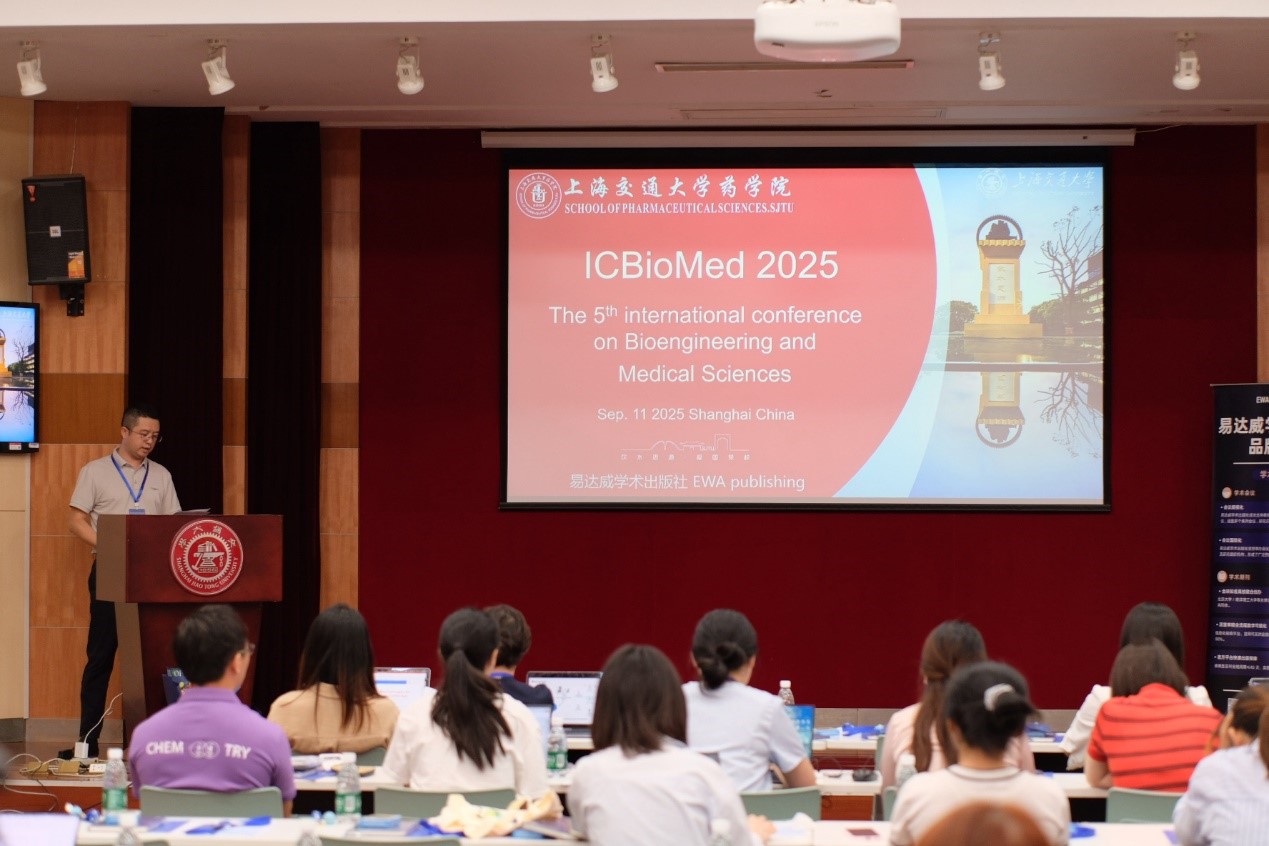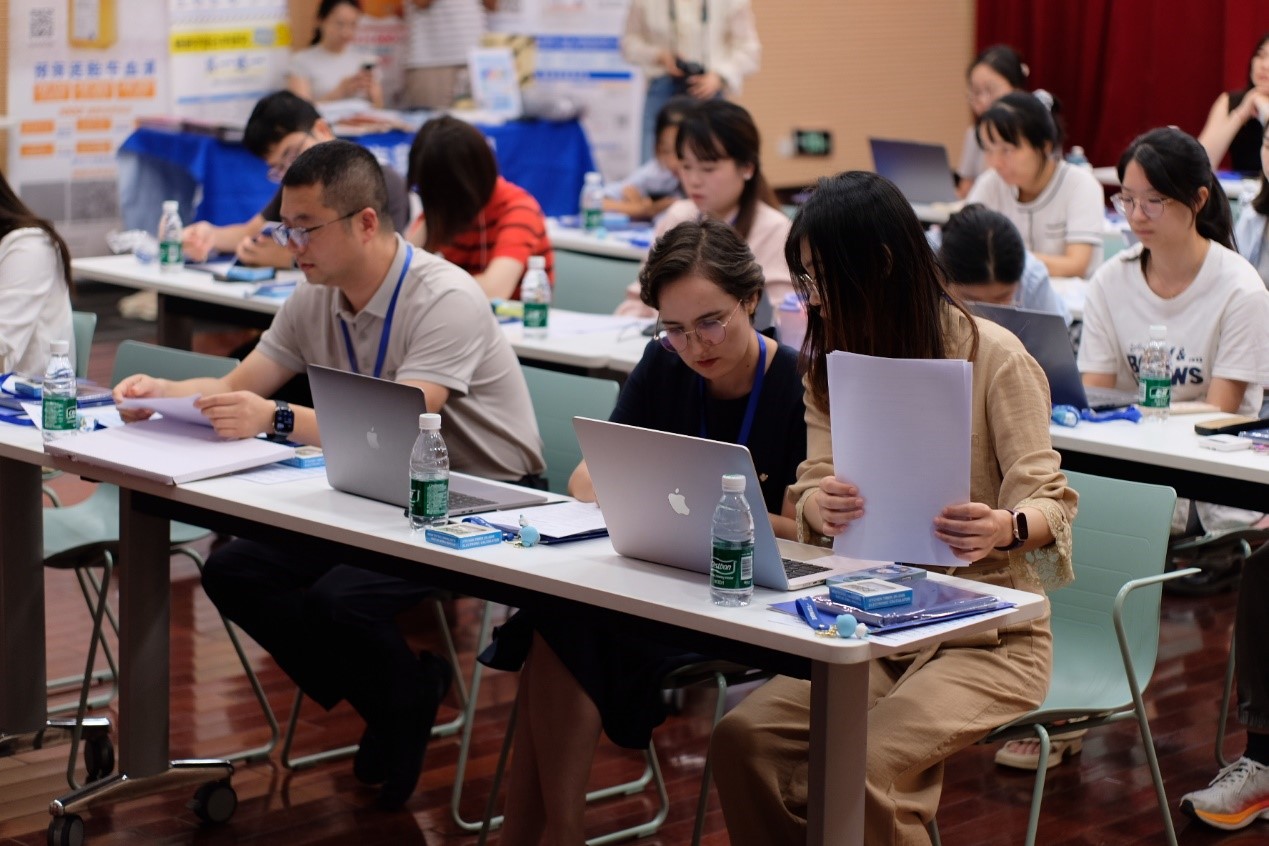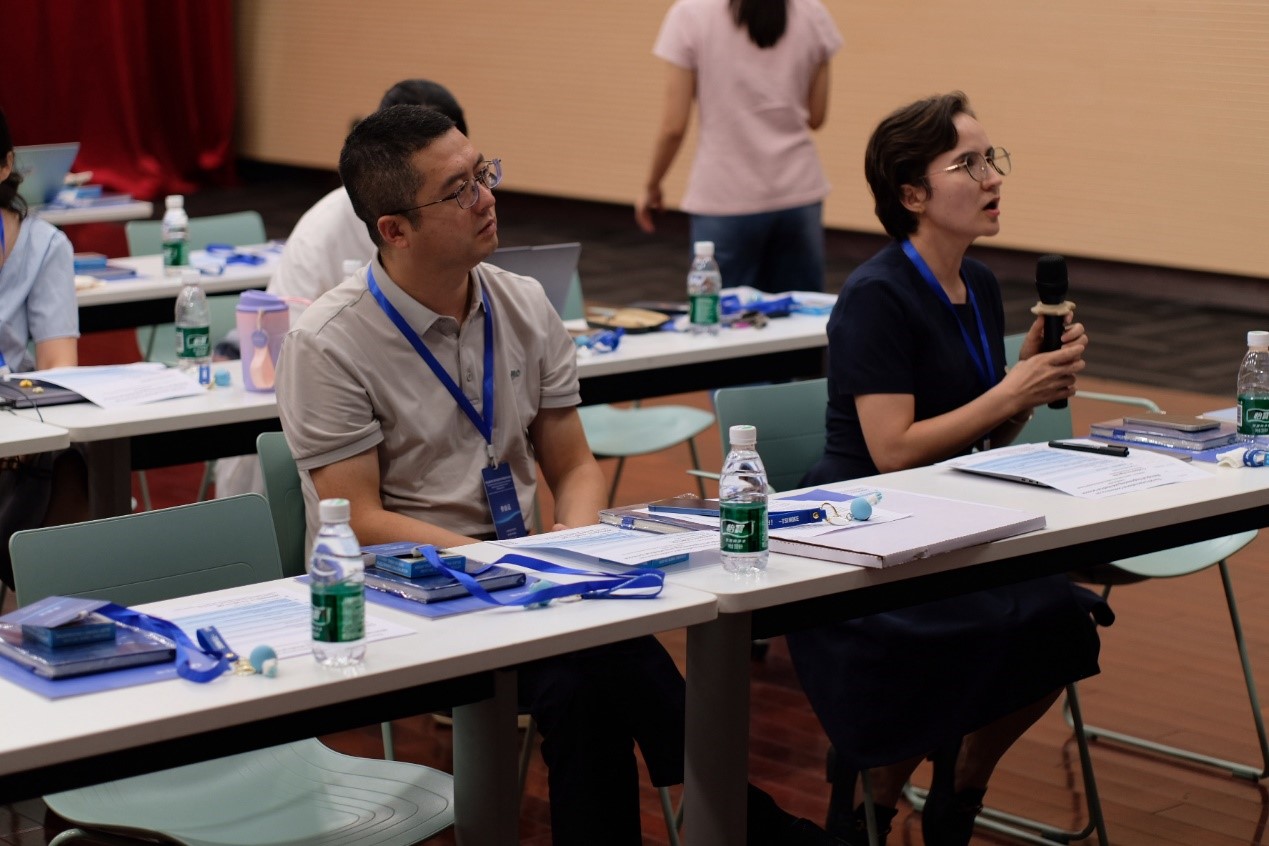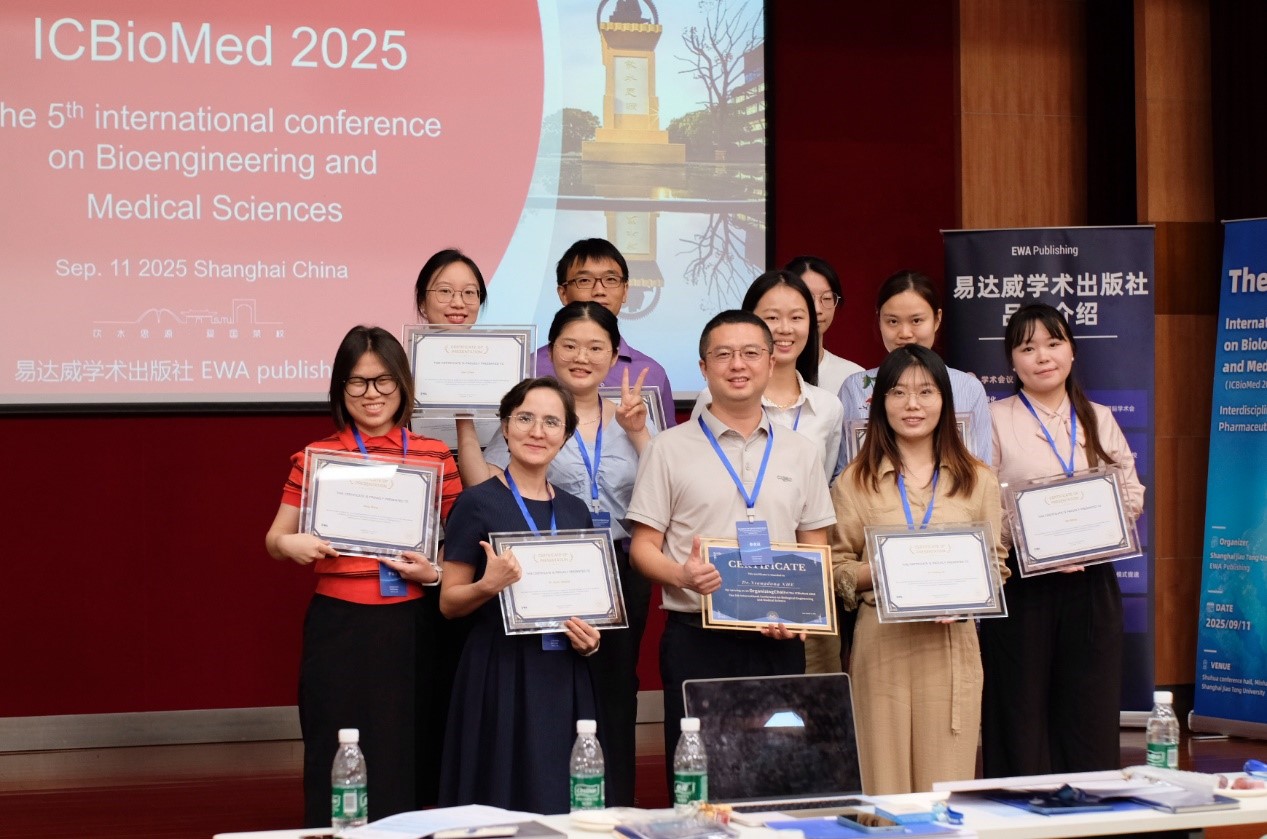Title:
Interdisciplinary Frontiers in Pharmaceutical Sciences
Date:
September, 11th 2025 (UTC +8)
Organizer:
School of Pharmaceutical Sciences, Shanghai Jiao Tong University
Symposium Chair:

Dr. Xiangdong Xue
Personal Bio:
Dr. Xiangdong Xue serves as an Associate Professor, Principal Investigator, and PhD supervisor at Shanghai Jiao Tong University. His research focuses on targeted nanomedicine-based immune modulation for tumor treatment and sepsis therapy. Dr. Xue obtained his PhD from the National Center for Nanoscience and Technology, Chinese Academy of Sciences, and subsequently completed a 5-year postdoctoral fellowship at Washington University in St. Louis and UC Davis in the United States. He has authored over 70 high-impact SCI papers, which have been cited more than 4,700 times, including these published in Nature Nanotechnology, Nature Communications, Advanced Materials, ACS Nano, Nano Letters, and Biomaterials. His work has been highlighted by F1000, Forbes, Science Daily, and the American Chemical Society. Additionally, he has filed two PCT international patents and nine Chinese patents. Dr. Xue is an editorial board member for journals including Materials Today Bio, Exploration, Biomaterials Translational, and iRadiology, and actively participates in youth committees of the Chinese Pharmaceutical Association, China Anti-Cancer Association, and Shanghai Pharmaceutical Association. Among his honors are the Shanghai Overseas High-Level Talent Award, the Royal Society of Chemistry’s Nanoscale Emerging Investigator (2024), the Chinese Biophysical Society’s Outstanding Young Scholar Award (2023), and Wiley’s High-Contribution Author Award.
Committee Members:
Dr. Haijing Qu, Shanghai Jiao Tong University, China, hjqu@sjtu.edu.cn
Dr. Yuqing Pan, Shanghai Jiao Tong University, China, panyuqing@sjtu.edu.cn
Call for Papers
Background:
Pharmaceutical sciences are at the forefront of addressing global health challenges, integrating advances in chemistry, biology, materials science, and clinical research. The development of next-generation therapeutics, such as targeted nanomedicines, biologics, and personalized medicines, demands a deep understanding of molecular mechanisms, drug delivery systems, and translational strategies. Emerging areas like immunotherapy, gene editing, and AI-driven drug discovery are reshaping the field, necessitating interdisciplinary approaches to tackle complex diseases like cancer, inflammation, and neurodegenerative disorders. This workshop, Interdisciplinary Frontiers in Pharmaceutical Sciences, provides a platform for researchers and students to explore these cutting-edge developments and their applications.
Goal/Rationale:
The workshop aims to establish a professional platform for pharmaceutical researchers and students to present cutting-edge research, engage in discussions on emerging trends, and develop interdisciplinary collaborations spanning chemistry, biology, materials science, AI and clinical research. By fostering dialogue on critical topics such as drug design, immunotherapy, and personalized medicine, the workshop seeks to bridge disciplinary divides, stimulate innovative approaches, and expedite the advancement of transformative therapeutics. This event is designed to equip early-career researchers with opportunities to expand their professional networks and make meaningful contributions to the field's development.
Scope and Information for Participants:
This workshop provides a dynamic platform for junior researchers, students, and established scientists to interact with leading experts in pharmaceutical sciences and related fields. It places strong emphasis on interdisciplinary research, particularly in the areas of drug discovery, delivery systems, and translational applications. Covering topics such as pharmaceutical chemistry, nanomedicine, and immunotherapy, the event promotes collaborative efforts to address challenges in the development of innovative therapeutics. Participants will explore critical issues, facilitating cross-disciplinary solutions and contributing to the advancement of the field.
Topics:
The main topics of this symposium are listed below.
Basic Science of Medicine
- Anatomy
- Medical Biochemistry
- Human Physiology
- Immunology
- Medical Microbiology
- Radiation Medicine
- Pharmacology
- History of Medicine
- Medical Cell Biology
- Tissue Embryology
- Medical Genetics
- Medical Virology
- Pathology
- Medical Statistics
Meanwhile, submissions aligned with the overall conference theme are also welcome.
Biomedical Engineering and Bioinformatics
- Biomedical Text Mining and Ontologies
- Clinical Data Analysis
- Genome-Phenome Analysis
- Pathogen bioinformatics
- Biorobotics and Biomechanics
- Biomedical & Health Informatics
- Translational Engineering for Healthcare Innovation and Commercialization
- Biomedical Intelligence
- Electronic Health Record
- Biomedical Signal/Image Analysis
- Biomarker Discovery
- Biomedical Sensors and Wearable Systems
- Therapeutic & Diagnostic Systems and Technologies
- Biomedical Engineering Education and Society
Clinical and Public Health
- Internal Medicine
- Anesthesiology
- Dermatology
- Pediatrics
- Ophthalmology
- Radiology
- Hematology
- Occupational Medicine
- Nutrition, Healthy Diet, and Dietary Balance
- Food Safety
- General Surgery
- Otorhinolaryngology
- Epidemiology
- Neurosurgery
- Oral and Maxillofacial Surgery
- Urology
- Physical Medicine and Rehabilitation
- Disease Control
- Health Care
- Sports Medicine
- Health and Sport Science
Biological Sciences
- Animal Science
- Bacteriology and Microbiology
- Cell Biology
- Ecology and Biodiversity Conservation
- Molecular Biology
- Plant Biology
- Agriculture and Horticulture
- Biochemistry
- Developmental Biology
- Marine Biology
- Paleontology
- Structural Biology
Biological Engineering
- Tissue engineering
- Protein Engineering
- Biotechnology
- Computational Proteomics
- Biomechanics
- Bioprocess Engineering
- Recycling Materials
- Genetic engineering
- Neural Engineering
- Biochemical Engineering
- Pharmaceutical Engineering
- Biological Systems Engineering
- Biomimetics
Submission:
Prospective authors are kindly invited to submit full papers that include title, abstract, introduction, tables, figures, conclusion and references. It is unnecessary to submit an abstract in advance. Please submit your papers in English.
Each paper should be no less than 4 pages. One regular registration can cover a paper of 6 pages, and additional pages will be charged. Please format your paper well according to the conference template before submission. Paper Template Download
Please prepare your paper in both .doc/.docx and .pdf format and submit your full paper by email with both formats attached directly to sympo_shanghai@icbiomed.org
Important Dates:
| Process Date & Time | Date & Time |
|---|---|
| Submission Deadline | September 4, 2025 |
| Symposium Date | September 11, 2025 |
| Notification of Acceptance | 7-20 workdays |
Publication:
Accepted papers of the symposium will be published in Theoretical and Natural Science (TNS) (Print ISSN 2753-8818), and will be submitted to Conference Proceedings Citation Index (CPCI), Crossref, CNKI, Portico, Engineering Village (Inspec), Google Scholar, and other databases for indexing. The situation may be affected by factors among databases like processing time, workflow, policy, etc.
Publication info
Title: Theoretical and Natural Science (TNS)
Press: EWA Publishing, United Kingdom
ISSN: 2753-8818, 2753-8826 (electronic)
This symposium is organized by ICBioMed 2025 and it will independently proceed the submission and publication process.
* The papers will be exported to production and publication on a regular basis. Early-registered papers are expected to be published online earlier.
Highlights:
On September 11, 2025, the symposium “Interdisciplinary Frontiers in Pharmaceutical Sciences” was successfully held at the Shuhua Conference Hall, Minhang Campus of Shanghai Jiao Tong University. The event gathered scholars and researchers from multiple institutions to explore the latest progress at the intersection of biological engineering and medical science. In his opening remarks, Professor Xiangdong Xue, Chair of the symposium, emphasized that pharmaceutical sciences are rapidly evolving by integrating advances in chemistry, biology, materials science, and clinical research. From targeted nanomedicines and immunotherapies to AI-driven drug discovery and personalized medicine, the field is tackling complex health challenges such as cancer, inflammation, and neurodegenerative diseases.
The symposium featured 11 presentations covering diverse topics, including organoid construction, tumor immunotherapy, dry eye disease management, sepsis immunoregulation, targeted drug delivery systems, and exosome engineering. The Q&A sessions encouraged active participation, particularly from young scholars, who engaged in dynamic discussions on issues such as treatment timing and drug design strategies.
In his closing remarks, Professor Xue highlighted that the innovative work presented reflected the deep integration of pharmaceutical sciences with biological engineering, materials science, and nanotechnology, providing valuable insights and inspiration for advancing interdisciplinary collaboration.






Ways to Participate
Venue:
800 Dongchuan Road, Minhang District, Shanghai, China
Attend in Person:
If you want to attend the symposium on-site, please email sympo_shanghai@icbiomed.org . The symposium seats are limited. Both contributors and non-contributors who wish to participate in the symposium in person need to apply to the symposium organizers.
VISA:
Visa for ChinaIn order to ensure the information is correct and up to date, there may be changes which we are not aware of. And different countries have different rules for the visa application. It is always a good idea to check the latest regulations in your country. You should confirm details with your local Consular Office. This page just gives some general information of the visa application.
China Visa Information
Check which visa you need to get
The majority of foreign citizens are required to obtain one of the China visas in order to visit the country, as there are only a few nationalities who are granted visa free entry for China for short stays. At the moment, travelers from countries who are not visa-exempt for China are obliged to apply for a visa in person from a Chinese embassy or consulate, with only a few exceptions, including for tour groups and airline crew from a few select countries. This is expected to change in the near future for select eligible nationalities when China introduces an electronic application form for visas. This will make it possible to apply for certain visa types for China exclusively online, eliminating the need to travel to an embassy or consulate in person.
As the launch date for the Chinese electronic is yet to be finalized, however, non visa-exempt citizens are still currently required to apply for one of the following visa types for China from an embassy or consulate.
China Visa Registration Process
Foreign nationals who wish to travel to China will need to follow a registration process to obtain their visa. The China Visa application form should be signed and every question must be answered. Applicants may select "none" if the question does not apply to their individual circumstances. Applications for the Chinese visa must be completed in block capital letters and handwritten changes will not be accepted. The signature on the China visa application must match the signature on the applicant's passport. People's Republic of China diplomatic missions require that each visa application is completed following strict guidelines. Supporting documents must be accurately and carefully prepared.
How Long Does It Take to Get a Visa to China
Generally speaking, if the applicant meets all the requirements, has all the necessary documents and holds a passport with at least six months validity and two blank pages it should take about four working days to get a Chinese visa. Some People's Republic of China Diplomatic Missions offer rush service, which speed up the processing time of a visa for China. Nonetheless, it is only available for cases of extreme urgency and depend on the approval of the Chinese Consular Office. Foreign nationals who wish to travel to Mainland China, whether it is for tourism, business, transit or other, are recommended to apply between two months to fifteen days before their departure. If the traveler applies with too much time in advance, they visa might expire before they can use it. When a visa for China is granted, the validity period of such visa begins from the moment it was approved.
How Do You Get a Visa for China?
The People's Republic of China has several types of visas in place. The visa a traveler needs depends on their citizenship, purpose of trip and the length of their stay. Currently, there are only some countries that are exempt from applying for a China visa to travel to Mainland China. However, the country does waive visas if the traveler meets specific requirements and is traveling to certain regions.
To apply for a Chinese visa, the traveler will need to complete an application form, attach a recently-taken color photo, submit the application and pay the respective fee. Tourist that are from non-visa exempt countries should apply for the Tourist (L) visa, issued to aliens who are traveling to Mainland China for tourism purposes only. Those who wish to carry out business in China will need to obtain the Business (M) China visa.
To successfully apply for a visa to China, the applicant will need to provide supporting documents and a valid passport. If applying for a Tourist (L) visa to China, the supporting documents refer to round-trip tickets, accommodation bookings, or an invitation letter from a travel agency in China. It is important to note that the China visa application requirements will vary depending on the type of visa the traveler is applying for.
